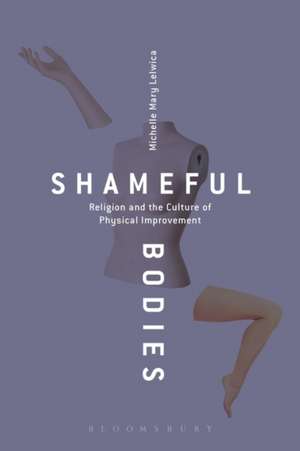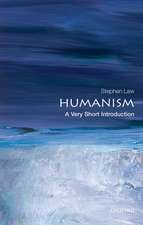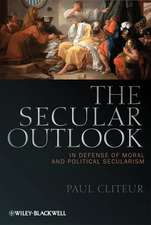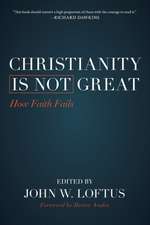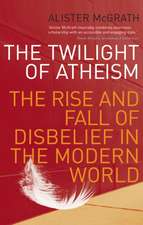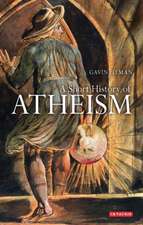Shameful Bodies: Religion and the Culture of Physical Improvement
Autor Michelle Mary Lelwicaen Limba Engleză Paperback – 11 ian 2017
| Toate formatele și edițiile | Preț | Express |
|---|---|---|
| Paperback (1) | 154.96 lei 6-8 săpt. | |
| Bloomsbury Publishing – 11 ian 2017 | 154.96 lei 6-8 săpt. | |
| Hardback (1) | 438.67 lei 6-8 săpt. | |
| Bloomsbury Publishing – 11 ian 2017 | 438.67 lei 6-8 săpt. |
Preț: 154.96 lei
Nou
Puncte Express: 232
Preț estimativ în valută:
29.65€ • 30.96$ • 24.49£
29.65€ • 30.96$ • 24.49£
Carte tipărită la comandă
Livrare economică 15-29 aprilie
Preluare comenzi: 021 569.72.76
Specificații
ISBN-13: 9781472594938
ISBN-10: 1472594932
Pagini: 288
Ilustrații: 25 bw illus
Dimensiuni: 156 x 234 mm
Greutate: 0.43 kg
Editura: Bloomsbury Publishing
Colecția Bloomsbury Academic
Locul publicării:London, United Kingdom
ISBN-10: 1472594932
Pagini: 288
Ilustrații: 25 bw illus
Dimensiuni: 156 x 234 mm
Greutate: 0.43 kg
Editura: Bloomsbury Publishing
Colecția Bloomsbury Academic
Locul publicării:London, United Kingdom
Caracteristici
Fills a gap for an analysis from a religious studies perspective of pain and idealised physical perfection, a vast aspect of western culture
Notă biografică
Michelle Mary Lelwica is Professor of Religion at Concordia College, USA. She is the author of The Religion of Thinness (2009) and Starving for Salvation (1999).
Cuprins
List of illustrationsPreface AcknowledgementsIntroduction Part One1. Deconstructing the "Better Body" Story 2. Christianity's Hidden Contributions to the Culture of Physical Improvement 3. Religious-like Features of the Culture of Physical Improvement 4. An Alternative Approach to Embodied Life Part Two5. Disability Shame 6. Fat Shame 7. The Shame of Chronic Pain and Illness 8. The Shame of Getting Old Epilogue Notes Selected bibliographyIndex
Recenzii
Lelwica (Concordia College) explores how the fascination with better bodies articulates contemporary priorities and social anxieties. While deftly analyzing the capitalist imperatives driving pop culture, Lelwica draws attention to the implicit religiosity of this fascination, in at least two senses. The first sense suggests how sacred texts and traditions impact how one perceives embodiment; the second sense argues for the quasi-religious functioning of perfecting one's physique. Here the author contends that exercise or beauty regimens operate like religious ritual, and the rhetoric of somatic improvement acts like a "salvation myth." This intriguing premise is only partially borne out in her readings of biblical texts and historical examples. Direct influences from religious discourses, such as theologies of Incarnation or Buddhist notions of impermanence, remain frustratingly vague, such that the enterprise begs the question of what is meant by "secular." Yet Lelwica is, as she writes in chapter 2, "more interested in intersections than causes," and her explication of the underlying connections between ableism, ageism, and fat (and other forms of body) shaming are both clear and convincing. The author integrates autobiographical passages with the ease of an experienced teacher. Summing Up: Recommended. Lower- and upper-division undergraduates; graduate students.
Shameful Bodies takes us on a wonderful journey of renewed understanding of the traps of our dominant culture regarding our bodies. It opens a new creative understanding based on freedom and mutual respect.
This excellent exploration is of interest not only to readers in Religious Studies, but also in Disability, Postcolonial and Feminist Studies. I highly recommend this exceptional work.
. [a] wide-ranging, insightful, and very instructive analysis of Western culture's obsession with bodily perfection ... A book that should appeal to anyone, including high school and college students, interested in the profound impact religion and culture have in shaping our identities and deepest sense of self.
Shameful Bodies takes us on a wonderful journey of renewed understanding of the traps of our dominant culture regarding our bodies. It opens a new creative understanding based on freedom and mutual respect.
This excellent exploration is of interest not only to readers in Religious Studies, but also in Disability, Postcolonial and Feminist Studies. I highly recommend this exceptional work.
. [a] wide-ranging, insightful, and very instructive analysis of Western culture's obsession with bodily perfection ... A book that should appeal to anyone, including high school and college students, interested in the profound impact religion and culture have in shaping our identities and deepest sense of self.
